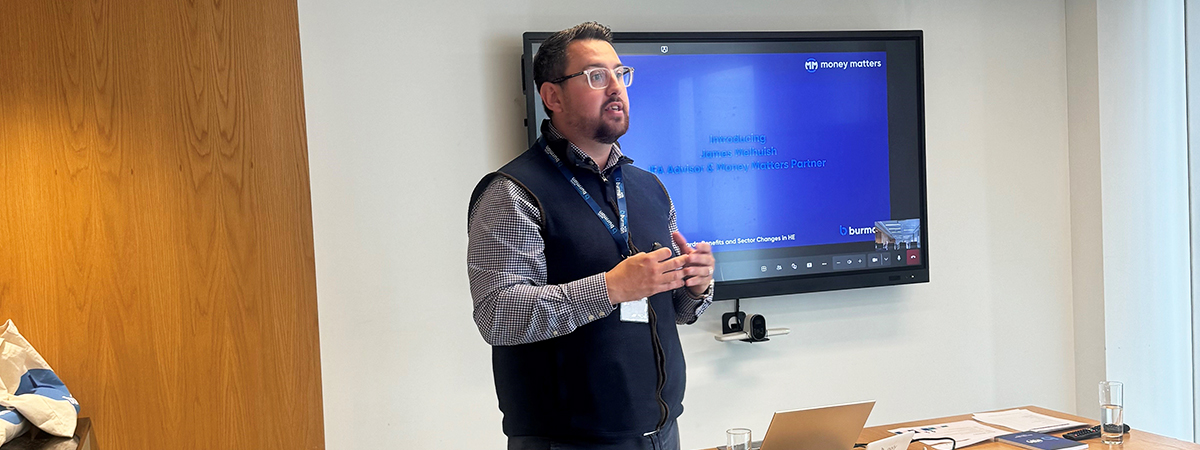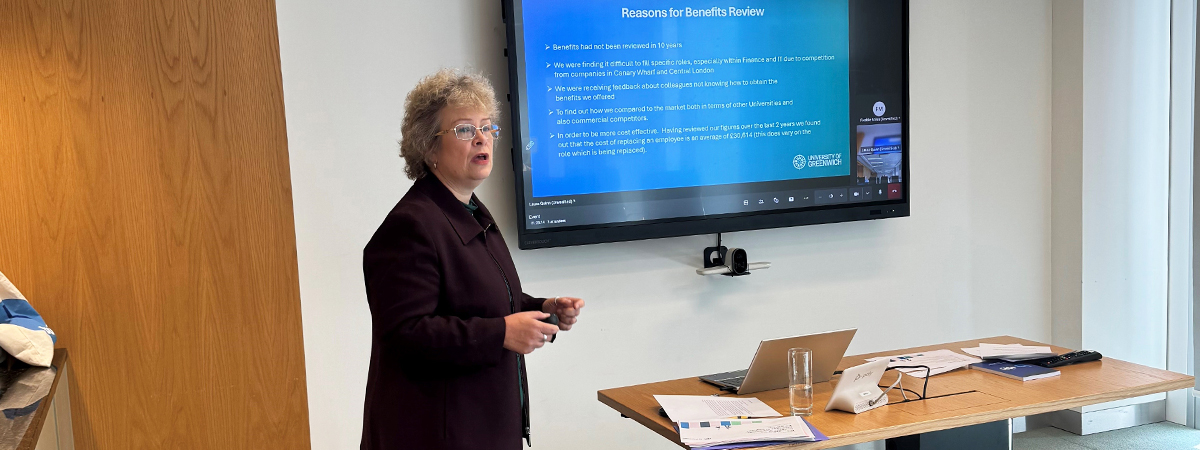On Friday, we hosted our Impact & Insights event at Monument in London, bringing together the Higher Education community to discuss key issues surrounding rewards, benefits, and sector changes. It was a hugely successful day, with engaged attendees making the event highly interactive. Thought-provoking questions and valuable perspectives were shared throughout the session and we are extremely grateful to our HE community who attended.
We were honoured to facilitate these important conversations and help drive positive change within the sector. Speakers James Melhuish, Juliet Fowler, Dexter Dyer, and Matthew Parlour all delivered insightful presentations. The event highlighted the evolving landscape in Higher Education, particularly with the impact of government changes and the growing need for tailored financial guidance.
The Speakers

James Melhuish - Bridiging the Employee Benefits Gap: Enhancing Employee Understanding & Engagement
“This is not a numerical problem, this is a psychological one. Throwing more money at the problem will not help, we as employers, need to think of new innovative targeted ways to engage our employees with their benefits including the ones that really effect personal finances”
At our event in London, James Melhuish, our in house financial wellbeing expert and independent financial adviser, emphasized a critical shift in understanding employee benefits: their value and engagement are primarily psychological, not numerical.
He argued that simply increasing the financial value of benefits will not necessarily lead to improved employee engagement or wellbeing. Instead, employers must focus on how these benefits resonate with employees on a personal and emotional level.

James highlighted the importance of tailoring benefit packages to meet the diverse needs and motivations of employees, suggesting that engagement is driven more by perceived value and alignment with personal goals than by monetary increases alone.
Building on James's insights, his talk focused on practical steps to enhance employee engagement in the higher education sector in the UK. He outlined strategies that institutions can adopt, such as creating personalized, relevant benefits that reflect the unique demands of academic staff, fostering a supportive workplace culture, and actively seeking feedback to ensure benefits are continuously aligned with employee needs.
Through this, we can foster greater connection and commitment, improving overall satisfaction and wellbeing among higher education professionals. Resulting in greater retention and attraction of good people.
Juliet Fowler - Why Benefits are More Important in the Current Workplace
Juliet discussed the benefit review within Greenwich University which has taken place over the last 9 months. We have investigated the benefits offered by conducting focus groups for all employees. Approximately 10% of employees attended a focus group to give us feedback on the current benefits they value and what they would like to be added in the future. We also found out that there were benefits employees didn’t know about, and some which were quite difficult to access. We are in the process of researching the market to find a suitable benefit platform so that we can put everything in one place. We are also considering what other benefit options we can introduce that will be valued by employees without breaking the budget!

Other topics discussed were:
- The importance of communicating all current rewards and benefits at induction and throughout the year.
- Ensuring all benefits and pay policies can be accessed in one location.
- Looking at whether flexible benefits would work for the University.
- Benchmarking benefits within Higher Education and for competitors.
- Top benefit request from employees – private healthcare.
- The importance of recognition.
- Hard to fill roles and the cost of replacing talent.
Dexter Dyer - Transitioning from Permanent Employment to Contracting: The Benefits, IR35 & Payment Options
This talk focused on the transition from permanent employment to contract work, specifically navigating the challenges and opportunities presented by IR35 tax legislation.
Dexter began by explaining IR35, a tax rule aimed at preventing "disguised employment," where individuals work as contractors through a limited company to avoid paying standard employee taxes. The key distinction under IR35 is whether you fall inside or outside the legislation.
Next, Dexter explained how assignment rates work for contractors. These rates are designed to cover not only the PAYE salary but also all associated employment costs, such as holiday pay, employer’s National Insurance, the Apprenticeship Levy, and workplace pension contributions.
A worked example was provided to help attendees understand how to calculate an equivalent contract assignment rate to a permanent salary. For instance, a £70,000 annual salary can be divided by 260 working days to estimate the required daily rate as a contractor.
The session also addressed why companies might choose to work with contractors via an umbrella company, which offers advantages such as continuity of employment, pension salary sacrifice options, benefits packages, and customer service support. Other perks like access to advance payments and partnerships with professional bodies were also highlighted.
For those considering full independence, the speaker outlined the steps for setting up a limited company (LTD), including:
1 - LTD Company Incorporation
2- Opening a business bank account
3 - Setting up a registered office address
4 - Filing a Self-Assessment tax return
5 - End-of-year accounts preparation and incorporation tax filing.
The talk provided valuable guidance for professionals considering the shift from permanent employment to contracting, covering both the legal framework and practical steps required to manage finances and tax obligations effectively.
Matt Parlour - Trade (Wars)... What are They Good for?
In this insightful talk, Matt explored the complexities of international trade and its significant role in driving economic growth. He emphasized that trade is a vital mechanism for boosting national economies through job creation, increased tax revenues, and enhanced economic stability. By examining historical and contemporary trade routes, Matt highlighted how interconnected the global economy is, with supply chains serving as lifelines for goods, services, and economic expansion.
However, the session also discussed the vulnerabilities of international trade to major disruptions such as wars, pandemics, and climate change. Matt explained how these factors could destabilize supply chains, potentially leading to increased inflation and a slowdown in economic growth. These disruptions have a direct impact on national economies and, in turn, influence policies concerning inflation control, employment, and fiscal health.

Matt also addressed the political context of trade wars, specifically referencing Donald Trump’s statement that “trade wars are good and easy to win.” With the realistic possibility of Trump returning to the White House, Matt reflected on what a more protectionist approach to trade could mean for the global economy. Potential consequences include strained international relationships, disrupted trade flows, and a negative ripple effect on global economic recovery, especially for higher education institutions that rely on global cooperation, research funding, and talent mobility.
In conclusion, Matt underscored the importance of understanding the relationship between trade, economic policies, and the broader impacts on job markets and education. As higher education is deeply intertwined with economic trends, particularly through research, innovation, and global partnerships, disruptions in trade and shifts in policy could have far-reaching implications for academic institutions, students, and future economic stability.




